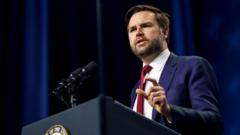Amidst rising tariffs discussions, Italian Prime Minister Giorgia Meloni engaged with President Trump at the White House, marking a pivotal moment in U.S.-European negotiations. Meloni's conservative stance reflects a broader sentiment in Europe as she seeks to bridge trade gaps despite Italy's notable trade surplus with America.
Meloni Visits Trump: Tariffs and Trade Concerns Take Center Stage

Meloni Visits Trump: Tariffs and Trade Concerns Take Center Stage
Giorgia Meloni's meeting with Trump highlights the shifting dynamics of European-U.S. trade relationships.
As negotiations on tariffs ramp up, Giorgia Meloni arrived at the White House to discuss trade issues directly with President Trump. This visit follows a recent meeting between Trump and a Japanese delegation and underscores Italy's position within a wider European context. Meloni, perceived as a key ally due to her nationalist viewpoints, aims to represent Italian interests while also speaking for broader European concerns.
During the meeting, Trump expressed optimism about achieving a trade deal with the European Union within a 90-day timeframe, reflecting his push for agreements on tariffs impacting luxury goods and automotive imports. However, Italy's defense spending remains a point of contention, as it has yet to meet NATO's prescribed targets.
While Meloni's visit may not yield immediate tangible results on tariffs, it serves as part of a larger strategy for the Trump administration to navigate the complexities of international trade and diplomatic relations. The meeting also highlights the ongoing tensions regarding trade balances and defense commitments, critical elements shaping the future of U.S.-European relations.
As discussions progress, the implications of these negotiations will be closely watched, especially given how tariff adjustments could impact various sectors, including the luxury market.
David E. Sanger has reported extensively on national security and the Trump administration, offering insights into both foreign policy challenges and the evolving political landscape.
During the meeting, Trump expressed optimism about achieving a trade deal with the European Union within a 90-day timeframe, reflecting his push for agreements on tariffs impacting luxury goods and automotive imports. However, Italy's defense spending remains a point of contention, as it has yet to meet NATO's prescribed targets.
While Meloni's visit may not yield immediate tangible results on tariffs, it serves as part of a larger strategy for the Trump administration to navigate the complexities of international trade and diplomatic relations. The meeting also highlights the ongoing tensions regarding trade balances and defense commitments, critical elements shaping the future of U.S.-European relations.
As discussions progress, the implications of these negotiations will be closely watched, especially given how tariff adjustments could impact various sectors, including the luxury market.
David E. Sanger has reported extensively on national security and the Trump administration, offering insights into both foreign policy challenges and the evolving political landscape.






















